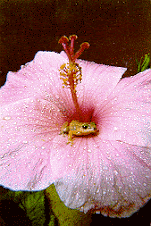Resveratrol May Prevent Breast Cancer
In Test Tube, Red Wine Supplement Blocks Estrogen Toxicity
By Daniel J. DeNoon
WebMD Health NewsReviewed by Louise Chang, MDJuly 7, 2008 -- Resveratrol, a nutrient found in red wine, keeps estrogen from causing breast cancer in test-tube studies.
Prolonged exposure to estrogen is a major risk factor for breast cancer. Most research has focused on the interactions between estrogen and estrogen receptors on breast cancer cells.
But when the body's system for processing estrogen gets out of balance, dangerous estrogen metabolites appear. These toxic compounds react with DNA in breast cells and jump-start the growth of tumors.
Now Eleanor G. Rogan, PhD, and colleagues at the University of Nebraska show that resveratrol decreases the processing of estrogen into these dangerous compounds. Perhaps more importantly, it also blocks interactions between estrogen metabolites and cellular DNA.
And that's not all. Rogan's team finds that resveratrol increases production of an enzyme that destroys dangerous estrogen metabolites.
"Resveratrol has the ability to prevent the first step that occurs when estrogen starts the process that leads to cancer," Rogan says in a news release. "We believe that this could stop the whole progression that leads to breast cancer down the road."
The Rogan team's findings come from studies of human breast cells grown in the laboratory. It's a long way from showing that resveratrol can actually prevent cancer in women.
Even so, there's a hopeful sign: Resveratrol had anticancer effects at very low doses.
"This is dramatic because it was able to be done with fairly low concentrations of resveratrol," Rogan says.
A resveratrol concentration of 10 micromoles per liter was able to keep estrogen metabolites from interacting with DNA. A glass of red wine has a resveratrol concentration between 9 and 28 micromoles per liter.
However, a 2007 study in the U.K. suggested that even very high doses of resveratrol do not achieve blood concentrations as high as those needed for anticancer effects.
Resveratrol is a naturally occurring antioxidant found in the skins of red grapes, red wine, red or purple grape juice, peanuts, blueberries, and cranberries. It's also available in dietary supplements.
Although many health claims have been made for resveratrol, the risks and benefits of taking this supplement have not been formally tested in definitive clinical trials.
Rogan and colleagues report their findings in the July issue of Cancer Prevention Research.
View Article Sources
SOURCES:
Lu, F. Cancer Prevention Research, July 2008; vol 1: pp 135-145.
Boocock, D.J. Cancer Epidemiology, Biomarkers & Prevention, June 2007; vol 16: pp 1246-1252.
News release, American Association for Cancer Research.
© 2008 WebMD, LLC. All rights reserved.
jueves, 10 de julio de 2008
Suscribirse a:
Enviar comentarios (Atom)


1 comentario:
No todo lo que brilla es oro...
Tengamos esperanza.
Cancer-Related Effects
Resveratrol is being studied to see how it affects the initiation, promotion, and progression of cancer. With regard to tumor initiation, it has been shown to act as an antioxidant by inhibiting free radical formation, and as an anti-mutagen in rat models [4]. Resveratrol appears to decrease tumor promotion activity by inhibiting cyclooxygenase-1 (COX-1) [4,11,12], an enzyme that converts arachidonic acid to pro-inflammatory substances that stimulate tumor-cell growth [3]. Studies related to progression have found that resveratrol induced human promyelocytic leukemia cell differentiation [4] and inhibited ribonucleotide reductase, an enzyme needed for DNA synthesis in proliferating cells [12]. One appealing characteristic of resveratrol's anti-cancer potential is its minimal toxicity to blood-forming cells [11]. More studies using both cellular and animal models are needed before any such data would be applicable to human use.
The similarity in structure between resveratrol and diethylstilbestrol (a synthetic estrogen) has prompted investigations into resveratrol's potential as a phytoestrogen (a plant compound that produces estrogen-like effects). However, these properties also stimulate the growth of human breast cancer cells [5]. This finding seems contrary to its other anticancer activities, and is a cause for concern.
The Bottom Line
Laboratory tests have clearly demonstrated that resveratrol may help prevent cardiovascular disease and cancer. However, there are several reasons why recommending a population-wide increase would be premature.
First, little is known about the absorption and clearance of resveratrol, the identities of its metabolic products, or its effects on the liver [5]. A study in rats showed that resveratrol is absorbed in the gut and has a high affinity for the heart and liver [13,14].
Second, the research on resveratrol has focused on its short-term effects [2] and has been dominated by in vitro studies on non-human models.
Third, its role as a potentiator of breast carcinomas may significantly limit its use, even for its "proven" benefits.
Finally, its main dietary source is red wine. Not only is its concentration in wine extremely variable, but recommending increased consumption of red wine to boost resveratrol intake could certainly do more harm than good. In spite of any beneficial aspects, red wine and other alcoholic beverages pose health risks that include liver damage and physical addiction.
The health-food industry is claiming that resveratrol is the wine component responsible for the "French Paradox." While taking resveratrol pills is certainly safer than heavy consumption of red wine, supplementing with unproven substances is generally unwise. At this point, occasional use of red wine seems far more prudent.
http://www.quackwatch.com/01QuackeryRelatedTopics/DSH/resveratrol.html
Publicar un comentario